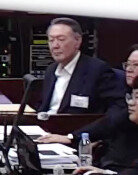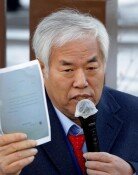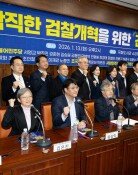Ex-Ministers Wealth Raises Suspicions
Ex-Ministers Wealth Raises Suspicions
Posted June. 19, 2006 03:02,
Prosecutors have shifted their investigative focus to any changes in the personal assets of former Deputy Prime Minister and Minister of Finance and Economy Lee Hun-jai. The investigation has been underway over the alleged involvement of the former deputy prime minister in the purchase of Korea Exchange Bank (KEB) by U.S. private equity fund Lone Star at a giveaway price.
According to the acquired information on Lees assets, the former senior official repaid his loan of one billion won in advance around August 2003 when the deal over the KEB acquisition was sealed. In addition, it was discovered that between June and October 2003, he sold land in Gwangju, Gyeonggi Province, at 5.8 billion won. The probe is underway whether the transactions were linked to the KEB sale.
Steep Increases in Personal Assets Draw Suspicion
On June 18, the Supreme Public Prosecutors Office (SPO) was investigating changes in assets during the intervening years between Lees resignation from his ministerial post in August 2000 and his return to the same post in February 2004.
According to asset registration record of public officials, his total wealth was valued at 2.5 billion won at the time of his resignation in 2000. But in February 2004, it jumped by 6.1 billion won to 8.6 billion won.
The suspicious part is the sale of land in Gwangju. Because of the land transactions, Lee was accused of being engaged in speculative real estate transactions in March 2005 and eventually had to step down from his office. What made the situation all the more suspicious was the fact that the deals were concluded before and after August 2003, the time of the KEB acquisition by Lone Star.
The land in Gwangju was bought by Lees wife on four occasions from 1979 through 1983. In October 2003, 11 co-buyers closed the purchase. In February 2004, they paid the balance for the land. In April of the same year, the ownership was transferred to the new co-owners.
Noticeable among the co-owners was a 39-year-old man known only by his last name Cha, who paid 1.66 billion won for a 5,800-pyong-farmland plot. The discovery intensified suspicion over the source of the 1.66 billion won: Cha is a truck driver who cannot afford to finance such a land purchase. It is known that he managed to pay the sum by taking out a loan. Still, the fact that his application for loan was approved in just one day and the loan money was transferred to his account in just a week left more people ever more doubtful.
On his increased personal wealth, Lee defended himself in March last year, saying, When I left for America to study in 1979, I bought some land in Gwangju. The sale of the land in 2003 added 4.6 billion won to my total assets, which I duly reported to the authorities.
The other investigative point at the moment is Lees repayment of a one billion-won loan two years ahead of schedule. In early 2003, He took out a loan from the KEB to purchase a house. Prosecutors are digging into the flow of the loaned money.
The initial contract between the former deputy prime minister and the KEB stated that the debts would be repaid in 10 installments from November 2003 through April 2006. However, the one billion-won debt was repaid from June 2003 through February 2004. Lees redemption period coincides with Lone Stars purchase of the KEB.
Lee explained, I paid back the bank loan with the savings from my matured fixed and installment account.
The Source of the Repayment Money
While there have been plenty of allegations made and questions raised, it is premature to conclude that the prosecution obtained conclusive information that proves Lees involvement in the Lone Star scandal.
On June 16, the investigative authorities banned the former deputy prime minister from leaving the country. But many observers view it as just part of the investigative procedures, including the account tracking, not as an indication that the investigators gained conclusive evidence.
Prosecutors are examining the source of Lees repayment money. They reportedly plan to look into the fees Lee received for his consultation services from Kim & Chang, a Korean law firm that represented Lone Star at the time of KEB purchase. The focus is to find out more about the financial compensation Lee received over Lone Stars successful acquisition of the KEB aside from the lawful consultation fees.
Audit results from the Board of Audit and Inspection will be published on June 19 and handed over to the prosecution. Based on the audit results, the prosecution will launch a full-fledged investigation by calling in those who actually have worked on the deal striking over the KEB transaction. Investigators will probe into whether they manipulated the BIS capital adequacy ratio and whether senior officials involved in the transaction were bribed.
Tae-Hoon Lee jefflee@donga.com needjung@donga.com



![[속보]국힘 윤리위, 한동훈 제명 결정…장동혁호 ‘뺄셈 정치’ 가나](https://dimg.donga.com/c/138/175/90/1/wps/NEWS/IMAGE/2026/01/14/133151701.1.jpg)



